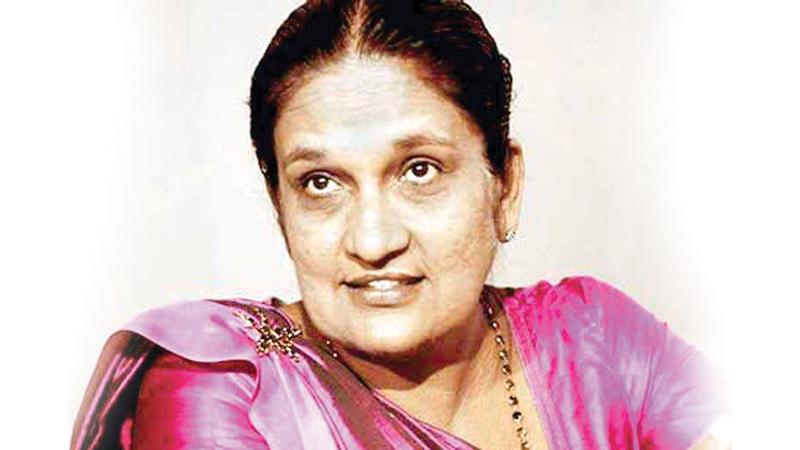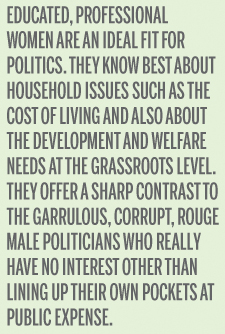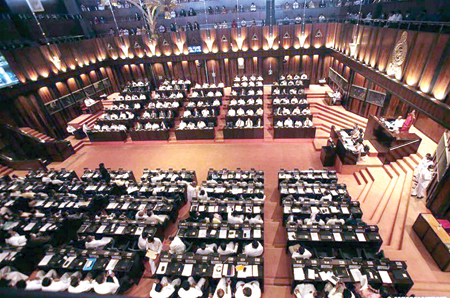
 For a country that produced the world’s first woman Prime Minister (Sirimavo Bandaranaike, 1960), Sri Lanka has an abysmal record when it comes to women’s representation in the political sphere, including Parliament.
For a country that produced the world’s first woman Prime Minister (Sirimavo Bandaranaike, 1960), Sri Lanka has an abysmal record when it comes to women’s representation in the political sphere, including Parliament.
This is ironic and paradoxical, given that 52 per cent of the entire population of 22 million are women and 56 per cent of the eligible voters are women. Total women’s representation in politics hovers around the 5 per cent mark, which is a telling indictment of our male-dominated political system.
IFES research
This glaring anomaly has gained international attention with international researchers conducting several studies. One such study was commissioned by the International Foundation for Electoral Systems (IFES) which recently published a research paper titled, Women’s Political Representation in Sri Lanka: Electoral System Analysis and Recommendations, which analyses the current standing of women’s representation and the main reasons behind the underrepresentation of women in politics, and offers recommendations for how to address the underlying and persistent barriers. You can access this report online at https://www.ifes.org/publications/womens-political-representation-sri-la....
Only one genuine attempt had been made previously to set things right – in the 2018 Local Government (LG) Elections, it was stipulated that 25 per cent of the nomination lists be reserved for youth and women. Over 17,000 women entered the fray from established political parties and Independent Groups and around 2,300 of them were elected to 335 LG bodies. However, with new reforms set to reduce the overall number of LG representatives to around 4,000, it is unclear what will happen to youth and women representation. But it is best to leave the ratio unchanged.
Far from perfect
 Things are far from perfect in the overall political landscape when compared with certain other developed and developing countries. Countries such as Bolivia and Cuba actually have more women engaged in politics than men. Rwanda is another developing country with such a ratio. Even relatively conservative nations such as Iran and Pakistan have a considerable number of women in active politics. Most other countries have a 50:50 ratio or at least a 60 (men):40 (women) ratio.
Things are far from perfect in the overall political landscape when compared with certain other developed and developing countries. Countries such as Bolivia and Cuba actually have more women engaged in politics than men. Rwanda is another developing country with such a ratio. Even relatively conservative nations such as Iran and Pakistan have a considerable number of women in active politics. Most other countries have a 50:50 ratio or at least a 60 (men):40 (women) ratio.
In this context, our record is indeed shameful. Sri Lanka ranks 182nd out of 193 countries on the Inter-Parliamentary Union (IPU) global database that ranks countries by the percentage share of women in their national Parliaments. Among its South Asian neighbors, only the Maldives has fewer women politicians in its Parliament than Sri Lanka.
Action must be taken to rectify this glaring shortcoming at the next national level election, be it LG, Provincial Council or a General Election (GE). And engaging in politics is a human right as well – one which should not be denied to women in any country at any level. This was one issue highlighted during yesterday’s celebration of the UN International Human Rights Day.
Difficulties
If one analyses the background of the few women MPs in the Sri Lankan Parliament, one fact becomes clear – most, if not all, of them come from political families. They either had a husband, brother, father, uncle or another male relative in politics. This is because it is extremely difficult for a woman to break into the local political scene without the right family connections.
Moreover, educated or professional young women simply cannot compete on a level playing field with thuggish male politicians with plenty of money to throw around in an entire district under the present Proportional Representation (PR) system. This could however be discouraged by the Campaign Finance laws due to come into effect soon. Moreover, the proposed electoral reforms envisage a mix of the PR and First-Past-the-Post (FPP) systems which might offer better prospects for professional women wishing to enter politics.
The overall toxic political culture with undertones of masculinity, sexism and misogyny also drives many aspiring young women away from the political field. After all, this is a country where women MPs have been verbally harassed even in Parliament by their male colleagues. In fact, all women MPs recently came to Parliament dressed in orange to highlight this culture of violence against women and girls. They were joined in this endeavour by female members of Parliament staff. They called for an end to violence against women in domestic, workplace and other settings, which is a dire need.
Ideal fit
Educated, professional women are an ideal fit for politics. They know best about household issues such as the Cost of Living and also about the development and welfare needs at the grassroots level.
They offer a sharp contrast to the garrulous, corrupt, rouge male politicians who really have no interest other than lining up their own pockets at public expense. Women voters must also be encouraged to vote for women candidates – rather unfortunately, many women vote for male candidates even when there are better women candidates on the ballot paper.
 In this context, all right-thinking citizens should applaud President Ranil Wickremesinghe for proposing a viable mechanism to increase women’s representation in the House and other political bodies. While stressing that neither the PR voting system nor a mixed (PR and FPP) system can ensure sufficient women and youth representation in Parliament, President Wickremesinghe has proposed a “list system” to fulfill the need.
In this context, all right-thinking citizens should applaud President Ranil Wickremesinghe for proposing a viable mechanism to increase women’s representation in the House and other political bodies. While stressing that neither the PR voting system nor a mixed (PR and FPP) system can ensure sufficient women and youth representation in Parliament, President Wickremesinghe has proposed a “list system” to fulfill the need.
The President proposed to have a list of around 70 Members which is compiled according to certain criteria where the number of women and youth Members that should be appointed to the House can be decided upon. This could also ensure that Members with a certain education level such as A/L or a graduate degree come to Parliament under such a list system. He urged Parliament to discuss and agree upon such a system soon, noting that a public mandate will have to be sought for this initiative if no agreement is reached by the Legislature.
Worthy suggestion
The President also went beyond the realm of politics, saying it is high time that women are appointed to the Boards of Directors especially at companies where there are large numbers of female employees such as in the apparel industries and plantation companies. This is also a worthy suggestion, as only a very few women hold top boardroom positions in Sri Lanka. And they should also be invited to enter politics at some point, to give another dimension to the country’s otherwise staid politics.
The President’s proposal to introduce a National Women’s Commission (NWC) is also timely, as this would be able to address many issues faced by women and girls in contemporary society. This will also tally with the proposed appointment of an Ombudswoman to look into the issues affecting women. It is hoped that women will be able to have a direct, confidential route to reach the Ombudsman.
Parliament, other political bodies and the media should discuss these issues extensively and arrive at a viable solution on the lines suggested by the President. It is especially important to seek the views of women themselves in this regard and political parties must scout for future women candidates with more enthusiasm, rather than relying on the same old set of corrupt male candidates repeatedly. This will pave the way for a refreshing change in the House as well as in other political bodies and give young Sri Lankan women a chance to be heard on the political stage. This will also be a positive step towards gender equality in Sri Lanka.
